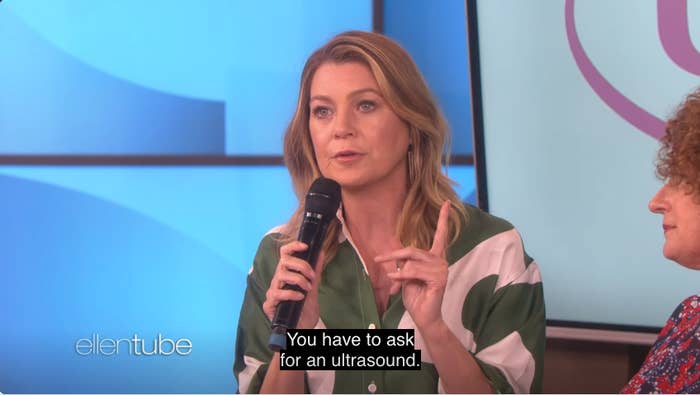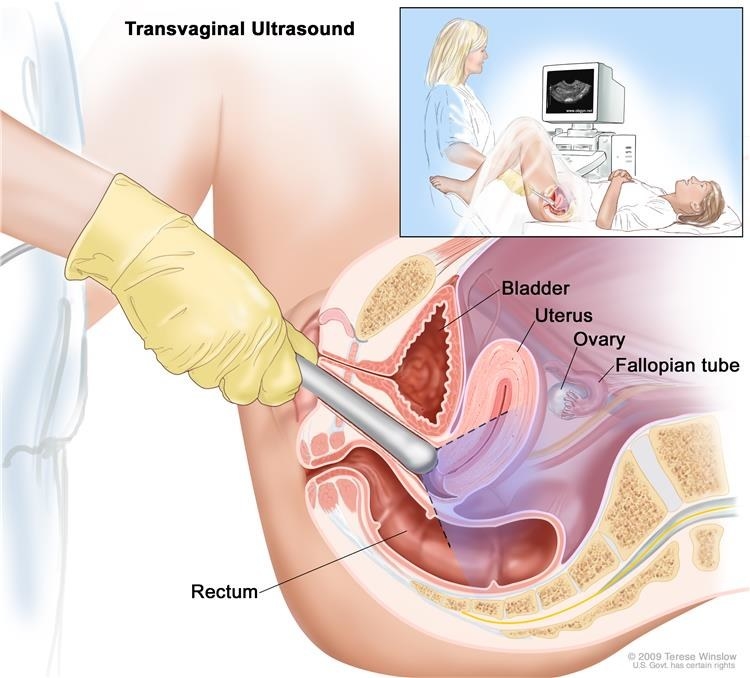On Tuesday, the actor Ellen Pompeo appeared on The Ellen DeGeneres Show and gave some well-intentioned but incorrect advice regarding ovarian cancer screening and ultrasounds.

Pompeo, who plays Dr. Meredith Grey on the hit ABC medical drama Grey's Anatomy, met with Ellen DeGeneres to discuss her return to the show's 16th season, among other things.
However, Pompeo ended up spreading some medical misinformation to viewers when she spoke about screening for ovarian cancer. This type of cancer accounts for only 3% of cancers in women but causes more deaths than any other cancer affecting the reproductive organs, according to the Centers for Disease Control and Prevention (CDC).
During a segment where DeGeneres auctioned off a Starbucks date with the actor to an audience member (with the proceeds going to breast cancer research), Pompeo asked if she could chime in — seeming to go off-script — and talked about something she had recently heard regarding ovarian cancer and ultrasounds.
Pompeo said that "all it takes is a simple ultrasound" to detect ovarian cancer, and that women should ask their doctor for one when they go in for checkups.

"When you go to the doctor, health insurance won't pay for the ultrasound... you have to ask ... So when you go to the doctor for your mammograms or your checkups, make sure you ask for the ultrasound because ovarian cancer is not detected otherwise and it's a simple ultrasound and you can catch it and live," Pompeo continued.
Pompeo seemed to be suggesting that you can check for ovarian cancer with an ultrasound as a part of your preventive health care routine. However, no major medical or professional organization recommends the routine use of ultrasounds to screen for ovarian cancer in women at average risk, according to the American Cancer Society (ACS).
While her intentions may have been good, Pompeo gave advice that went against current guidelines and implied that people should ask their doctors for unnecessary, costly, and potentially risky testing. This type of screening hasn't been shown to be helpful or save lives for women without symptoms or an increased risk of developing ovarian cancer.
The error was pointed out by San Francisco-based OB-GYN Dr. Jen Gunter on Twitter, and in a post on her blog, as well as by several other medical professionals.
Gunter told BuzzFeed News that statements like Pompeo's can influence health decision-making and potentially lead people to have a greater mistrust of doctors. "The implication was very much that doctors are dropping the ball and not doing this for you... It's fine to raise awareness but to tell people they should get a specific test... well, what's the fallout when a physician says no?"
@EllenPompeo @TheEllenShow Ultrasound does not screen for ovarian cancer. You just gave 4 million+ people incorrect medical information. This is exactly how fake medical news spreads.
There is no effective way to screen for ovarian cancer in women who are asymptomatic or not considered to be at high risk.

Routine screenings are used to check for diseases in people who have no signs or symptoms of the disease. Diagnostic tests, on the other hand, are used to look for a disease when doctors have a high suspicion that someone has it, say, if they are having symptoms.
Because any type of routine screening or test in a healthy person comes with risks — for example, mental stress, unnecessary tests and biopsies, or even surgery if the screening produces a false positive — large studies are done to determine exactly when the benefits of a test outweigh the risks.
For example, mammograms can be used to screen for breast cancer before you or your doctor can feel it, but they've only been shown to be helpful in women starting in their forties, or for those who are at high risk for other reasons.
Unfortunately, there is no equivalent for ovarian cancer. "If ultrasounds were a highly effective screening tool, we’d be doing them," Gunter said.
The US Preventive Services Task Force (USPSTF) recommends against screening for ovarian cancer in asymptomatic women who are not known to have a high-risk hereditary cancer syndrome. (For example, if you carry the BRCA gene mutation or have a strong family history of ovarian cancer.)
A doctor may test you for ovarian cancer if you have persistent symptoms or you are considered to be high-risk, but it depends. Whether or not you need testing (and what kind you need) really comes down to having a conversation with your doctor — and if necessary, a genetic counselor — about your medical history and risk factors.
In addition to a pelvic exam, two types of exams are commonly used to test for ovarian cancer, according to the ACS: transvaginal ultrasound (TVUS), and the CA-125 blood test. However, these can have high false-positive rates and can sometimes lead to potentially unnecessary tests or surgeries.
Well-meaning (but INCORRECT) advice by @EllenPompeo on @TheEllenShow on ovarian cancer. @DrJenGunter gives great overview of correct info.Hopefully @TheEllenShow and @EllenPompeo can set record straight publicly https://t.co/Y71FCRYv1g
Unnecessary transvaginal ultrasounds may result in extra medical costs, pain, and false reassurance, Gunter said.

In addition to having no value as a screening tool for average- or low-risk women, Gunter explained, these ultrasounds can also come with risks of their own.
In order to perform this type of ultrasound, doctors have to use a vaginal probe, which could be painful for some women, especially if they are postmenopausal, said Gunter. Depending on your insurance status, they can cost hundreds of dollars, so you may end up spending a lot of money — especially if you get an ultrasound during your annual checkup (as Pompeo suggested).
Ultrasounds can give women false reassurance if the cancer is not detectable, and there's also a risk of a false-positive result — when the test incorrectly indicates the presence of cancer where there is none. Ultrasounds only tell you if a mass exists, not whether it's cancerous or not. "It can lead to inappropriate surgeries because [doctors] see things and don't know what they are and have to take them out, then it’s benign," Gunter said.
"In studies of women at average risk of ovarian cancer, using TVUS and CA-125 for screening led to more testing and sometimes more surgeries, but did not lower the number of deaths caused by ovarian cancer," according to the ACS.
Pompeo responded on Twitter, saying "it was totally unscripted based on [a] conversation I had just had..." She thanked Twitter users for the correction.
Absolutely but it was totally unscripted based on an conversation I had just had with someone who had an experience to share a great opportunity for us to get the right facts out there for women https://t.co/1XPH68npWt
Ultimately, if you are concerned about ovarian cancer or have any questions about screening, talk to your OB-GYN.
Your doctor can perform an examination and review your medical history and risk factors to determine if you need further testing, such as an ultrasound, or if you should see another specialist, such as a genetic counselor or an oncologist.
While Pompeo was certainly acting in good faith and probably helped raise some awareness among viewers, she's only a doctor on television — let's leave the actual medical advice to the professionals IRL.
